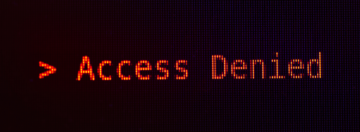Nidal Hasan’s Security Clearance
Once again the news media got it wrong. Referring to the Report of the DoD Independent Review Related to Fort Hood (Protecting the Force: Lessons from Fort Hood), an Associated Press article, claimed:
“Their investigation also found his top-level security clearance hadn’t been properly investigated.”
A WashingtonPost.com article stated:
“The report also said that Hasan was granted a top-level security clearance in February 2008 but that his background check did not include interviews with co-workers, supervisors or Hasan himself.”
The DoD report actually stated:
“[Hasan] held an active and current SECRET security clearance based on a February 2008 National Agency Check with Local Agency and Credit Check of [sic] background investigation. Although accomplished in accordance with current guidelines, this background investigation did not include a subject interview or interviews with coworkers, supervisors, or expanded character references.”
A Secret clearance can hardly be characterized as a “top-level security clearance,” and if it was “accomplished in accordance with current guidelines” it was incorrect to claim that it “hadn’t been properly investigated.” A standard NACLC has the narrowest scope of any security clearance investigation and does not include a Subject Interview or any reference interviews. It simply isn’t capable of surfacing the type of information that might have made a difference in Hasan’s case.
The DoD report went on to criticize the adequacy of the NACLC for Secret clearances, the vagueness of the Adjudicative Guidelines, and insufficient training on how and to whom significant information is reported. However, the DoD report did not cite any specific examples of vagueness in the guidelines or insufficiency in training. Army Regulation 380-67, “Personnel Security Program” states, “the supervisor must ensure that all relevant information is reported to the local command security official responsible for processing the investigative paperwork.” It also states, “Coworkers have an equal obligation to advise their supervisor or appropriate security official when they become aware of information with potentially serious security significance regarding someone with access to classified information or employed in a sensitive position.” Guideline A of the Adjudicative Guidelines appears equally clear and unambiguous about the issue of loyalty and allegiance.



Comment Archive
Typical,
Blame the Clearance process, which has nothing to do with the lack of leadership in Hasan’s command. We as Investigators could have interviewed a thousand people and still the info would have ended-up in the same hands that allowed this guy to continue doing what he did. If I recall correctly, he was already being watched but was a “Small Fish” in the eyes of the Intelligence community. I could literally talk about the incompetence in this situation for days and this blog is in no way big enough to hold all the keystrokes 🙁
Hey BW , how have you been? I know the admin discourages posting personal e-mails on here and I don’t blame them because who knows who reads this site but I would like to pick your brain. I am wondering if the admin would be willing to provide my e-mail address to you so you could e-mail me. Thanks.
Investigator,
Life’s good–YOU?–been non-stop, crazy busy as always. If they are willing–I’m good with it.
Investigator,
I think William posts these stories just to hear me rant 🙂
BW:
I wrote and submitted this item to admin who posted it for me, because (like you) I get tired of everyone (particularly the media who should research what they present as facts) blaming the clearance system for failing to catch every sociopath who undergoes a clearance investigation. You get what you pay for. If the critics want more comprehensive investigations, they need to convince the government it’s worth the price. It is absurd to expect that a $221 investigation is going to surface information that indicates that a person has symapthic feelings toward a group or movement that advocates violence. An SSBI would probably have caught this guy, but it costs 16 times more than an NACLC. About 75% of the roughly 500,000 initial clearance investigations each year are NACLCs.
If you and Investigator want to exchange email addresses, just contact me (click on my name above this post) and I’ll put you in touch with each other.
William,
I agree and, in my opinion these doctors should be cleared to TS at least during wartime. These young troops, fresh from a possible classified mission are expected to open-up and the med staff should be prepared and able to recognize this.
There is a whole credentialing process that takes place before a physician can get privileges to practice at a hospital, which I would imagine took place. It is a background investigation of its own, and often physicians are granted provisional privileges and have proctors who monitor their work and write reports which are reviewed to decide if the doctor gets medical staff privileges. He must have passed through that process as well. Hmmm.
BW and William,
What are your thoughts on OPM’s new guidance regarding not letting anyone at all be in with the SJ during a PRSI (including IRS cases)? I would think if the SJ is under 18 and the SJ’s parent or guardian wants to be present they should be allowed. Just my opinion.
Investigator,
While I understand your point, I think anyone under age is probably emancipated…ie…has a job and on their own. Also, everything we do is Non-Custodial, so really no right to counsel or anything else. I personally think it’s a good thing but I would suggest on top of telling someone it is voluntary–we should advise they may terminate the interview at any time, of course explaining the outcome or potential outcome of non-compliance.
I can see your point. I wonder how the IRS is reacting to this. I know it was huge for a union member to be a part of the PRSI. I am sure there will be some sort of lawsuits down the line because of this.
Also BW regarding what we have been e-mailing about I am trying to figure out some financial things before I move forward. Thanks for your advice.
Investigator,
I was pretty fortunate and any cases I worked, the employee never asked for a union rep. Did once have an attorney present, but what a huge waste of money for the Subj and I had even told the Subj in advance.
Sorry if this is off topic, but I don’t know the appropriate place for this question.
Citing the Security Questions FAQ on clearancejobs.com, average adjudication time in early 2006 for initial TS clearances was 39 days. I’m up for a Secret and I’ve been in DOHA adjudication for 2 months. I’d like to know if anyone has any more recent information on DOHA adjudication times. Is the situation getting better? Worse? I’d appreciate any information or personal stories. Thanks!